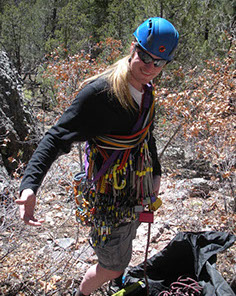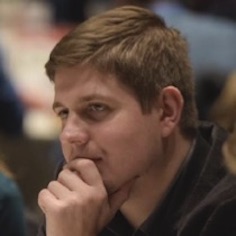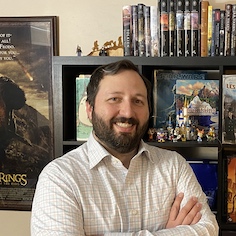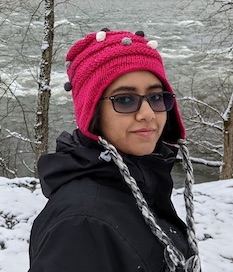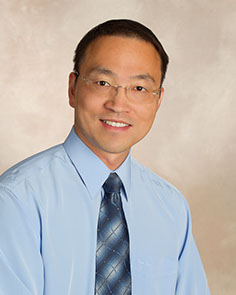Contributors
Current
Ben Bergen
CAI-1 Applied Computer Science
Los Alamos National Laboratory
Ben is a computational scientist working on problems in space physics and weapons science. He is also interested in understanding and developing programming models and tools for modern computing architectures.
Ben was the first project leader for FleCSI and now leads the effort to write specializations for it.
Richard Berger
CAI-1 Applied Computer Science
Los Alamos National Laboratory
Richard is a computational scientist in the Co-Design team with a background in Mechatronics, high-performance computing, and software engineering. He is currently contributing to the core development of FleCSI and working on improving builds on multiple platforms.
Jonathan Graham
CAI-1 Applied Computer Science
Los Alamos National Laboratory
Jonathan has a multidisciplinary background in observational solar physics, turbulence theory, astrophysical simulation, the oil and gas industry, and programming models for exascale computing. He has published papers evaluating mesoscale ocean large-eddy simulation models by employing spectral transfer analysis, determining the limits of fractal extrapolation of the mean solar magnetic flux, and investigating the small scale dynamo in convective, radiative magnetohydrodynamics, as well as several papers on using mathematical closures for large eddy simulations.
Jonathan has been involved in using Legion task-based parallelism for exascale computing both in proxy applications and in the development of FleCSI.
Davis Herring
CAI-1 Applied Computer Science
Los Alamos National Laboratory
Davis is a physicist and computer scientist with experience in numerical modeling techniques and software library design. Before working on FleCSI, he was the lead architect for Ingen, the unified library developed by the SimTools project for creating geometric models, 2D meshes, and physical parameter input for computational physics simulations. He has also published on the subject of molecular dynamics simulations conducted in T-1. Davis represents LANL on the ISO C++ committee; in turn, he has worked to improve the user-interface and maintainability of FleCSI 2 by taking advantage of modern C++ features.
Davis is the current technical lead for FleCSI.
Christoph Junghans
CAI-1 Applied Computer Science
Los Alamos National Laboratory
Christoph is a computational physicist with a background in molecular dynamics and multi-scale physics applications. He also has experience in software engineering and task-based run-time systems. His interests lie in understanding modern computing architectures and the design of sustainable code. Christoph is the CAI-1 group leader.
Julien Loiseau
CAI-1 Applied Computer Science
Los Alamos National Laboratory
Julien is a High Performance Computing scientist in the Co-Design Team at LANL. His research focuses on the new parallel and distributed architectures for the next generation of supercomputers for scientific simulation. He is currently working on several aspects of development from topology in FleCSI, GPU support using Kokkos in the Exasheds project and Smoothed Particles Hydrodynamics as lead CS developer of FleCSPH.
Maxim Moraru
CAI-1 Applied Computer Science
Los Alamos National Laboratory
Maxim is a computational scientist in the Co-Design team with a background in High-Performance Computing. His research interests include high-speed communication, runtime systems, and machine learning models. He is currently working on implementing mapping strategies for optimizing FleCSI’s mapper.
Scott Pakin
CAI-1 Applied Computer Science
Los Alamos National Laboratory
Scott is a computer scientist with broad interests in high-performance computing, including programming models, high-speed communication, performance analysis, and quantum computing. He is the team leader for the CCS-7 Co-Design Team and has been serving since October 2021 as the FleCSI project lead.
Alumni
David Daniel
CCS-7 Applied Computer Science
Los Alamos National Laboratory
David is a computational scientist with a broad background in parallel computing and in physics research from QCD to cosmology.
Irina Demeshko
CCS-7 Applied Computer Science
Los Alamos National Laboratory
Irina is a computational scientist and former Co-Design Team lead. Her research interests are focused on new HPC technologies in application and large-scale scientific simulation codes. Her current work at LANL was directed at integrating task-based runtime systems into several software projects at LANL, including the FleCSI and CANGA projects.
Charles Ferenbaugh
CCS-7 Applied Computer Science
Los Alamos National Laboratory
Charles Ferenbaugh is a computer scientist and software engineer on HPC code projects in LANL’s Advanced Simulation and Computing program. He currently contributes to two large multiphysics code projects: the Eulerian Applications Project and the Ristra/Next Generation Code Project. He has also been a part of LANL research efforts in advanced architectures and programming models.
Brendan Krueger
CCS-7 Applied Computer Science
Los Alamos National Laboratory
Brendan is a computational scientist with a background in nuclear astrophysics, multiphysics simulations, high performance computing, and software engineering. Before joining the Co-Design team, he worked in the Eulerian Codes group, contributing to projects including the xRAGE code, the Singe thermonuclear physics library, and the Portage remapping library.
Sumathi Lakshmiranganatha
CCS-7 Applied Computer Science
Los Alamos National Laboratory
Sumathi is a computational scientist in the Co-Design team. Her research interests include high-performance computing, machine learning models, real-time simulations and analysis for large scientific applications. She received her PhD in Electrical Engineering from the University of Wyoming in 2021. Her PhD work was focused on HPC and machine learning techniques to reduce the computational burden in analyzing the dynamics of complex systems. She also worked on porting to and optimization of MPAS atmosphere weather model on GPU architectures using OpenACC. She adding shared memory programming model support to FleCSI using Kokkos.
Jonas Lippuner
CCS-2 Computational Physics & Methods
Los Alamos National Laboratory
Jonas is a computational scientist with a background in computational and nuclear astrophysics. His research has been focused on the origin of heavy elements like silver, gold, and uranium. He has developed a sophisticated nuclear reaction network to simulate how such elements and thousands of other isotopes are created in various astrophysical scenarios, such as the merger of two neutron stars or the explosion of a massive star. Jonas also has extensive experience with developing highly optimized code for GPUs. He is working on implementing physics applications on top of the FleCSI framework.
Li-Ta (Ollie) Lo
CCS-3 Information Sciences
Los Alamos National Laboratory
Li-Ta Lo is currently a computer scientist with the Data Science at Scale team of Los Alamos National Laboratory. His research interests include data science, large-scale visualization and analysis, data-parallel programming and software engineering for scientific computing. His work for FleCSI focused on providing an efficient and scalable MPI backend.
Nick Moss
Data Science Team
Medable
Nick is a computer scientist and former member of the CCS-7 programming models team with expertise in programming systems and domain-specific languages, compiler design, LLVM, C++ internals and Clang, parallel, concurrent, and task-based programming models, and distributed data systems.
Nick is one of the primary designers of FleCSI, having designed and implemented various parts of its infrastructure including mesh and tree topology, data model, and distributed task execution, and more recently has worked on the Kitsune project to produce a specialized FleCSI compiler.
Max Ortner
CCS-7 Applied Computer Science
Los Alamos National Laboratory
Max completed a post-bachelor internship on the CCS-7 Co-Design Team. He has broad interests in physics (from QFT to General Relativity) and computer science, specifically highly performant, low-level graphics systems and scientific data handling with MPI I/O. He developed features related to efficient memory usage for FleCSI.
Andrew Reisner
CCS-7 Applied Computer Science
Los Alamos National Laboratory
Andrew is a computer scientist on the Co-Design Team with a background in parallel and scientific computing. His research interests include scalable solvers and performance models as a predictive tool for guiding applications. His current work is focused on the integration and performance analysis of applying FleCSI to software projects at LANL, including the CANGA project.
Karen Tsai
CCS-7 Applied Computer Science
Los Alamos National Laboratory
Karen is a computer and computational scientist who is interested in understanding, designing, and developing application code with scientists. She is also interested in learning about and utilizing modern computing tools to optimize algorithms and visualize complex datasets. She has a Master of Science in Computational Science, Engineering and Mathematics and a Bachelor of Science in Computer Science from the University of Texas – Austin. Karen joined the Co-Design Team in the fall of 2017 to work on the Ristra and FleCSI projects.
Wei Wu
CCS-7 Applied Computer Science
Los Alamos National Laboratory
Wei is a computer scientist whose research is focused on runtime systems and programming models for heterogeneous systems. He has worked on a variety of task-based runtime systems, such as Legion and PaRSEC. He was also a member of the Open MPI team, developing CUDA-aware capability for Open MPI. Wei received his Ph.D. in Computer Science from the University of Tennessee at Knoxville and joined the Programming Models team in 2017.




